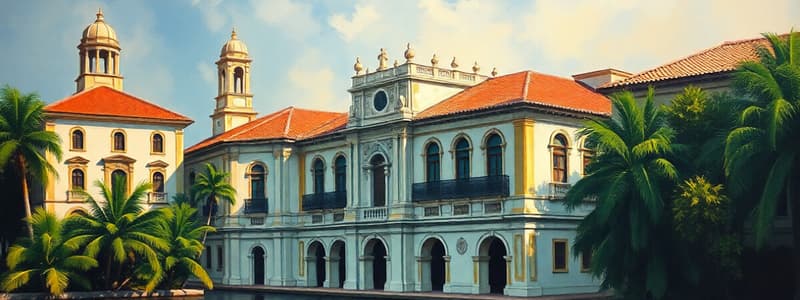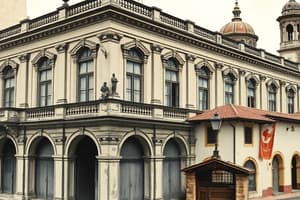Podcast
Questions and Answers
What materials were primarily used in the construction of Filipino houses before the arrival of the Spaniards?
What materials were primarily used in the construction of Filipino houses before the arrival of the Spaniards?
Bamboo, palm, vine, grass, and wood were primarily used.
What architectural advancements were made in houses during the Spanish period as compared to the pre-Spanish period?
What architectural advancements were made in houses during the Spanish period as compared to the pre-Spanish period?
Stronger materials like adobe stones were used, moving away from lighter materials.
What architectural feature distinguishes the San Agustin Church from other churches in the Philippines?
What architectural feature distinguishes the San Agustin Church from other churches in the Philippines?
It is constructed with true barrel vaulting, allowing it to withstand severe earthquakes.
Describe the construction style of most churches in Region I, such as the Paoay Church.
Describe the construction style of most churches in Region I, such as the Paoay Church.
What key architectural feature did the Manila Cathedral have, and what happened to it in 1863?
What key architectural feature did the Manila Cathedral have, and what happened to it in 1863?
Flashcards
Pre-Spanish Filipino houses
Pre-Spanish Filipino houses
Built with light materials like bamboo, palm, vines, grass, and wood; characterized by pyramidal roofs and raised floors.
Spanish Period architecture
Spanish Period architecture
Houses transitioned from light to stronger materials like adobe; churches and government buildings (Casa Real/Casa judicial) prominent in plazas; walled cities were built.
San Agustin Church
San Agustin Church
Early important church in Intramuros, known for barrel vaulting, earthquake resistance, and architectural significance in the Philippines.
Manila Cathedral
Manila Cathedral
Signup and view all the flashcards
Philippine provincial churches
Philippine provincial churches
Signup and view all the flashcards
Study Notes
Pre-Spanish Architecture
- Filipino houses used light materials like bamboo, palm, vines, grass, and wood.
- Roofs were pyramidal.
- Walls were low, and floors were raised above ground level.
Spanish Period Architecture
- Early Spanish houses used light materials, later adobe stones.
- Churches were built on one side of plazas, government buildings on the other.
- Native houses were outside town centers.
- Palisades, then stone walls, protected the walled city (Intramuros).
- Intramuros construction was an engineering feat, with architectural details on gates (e.g., Fort Santiago).
Intramuros Churches
- San Agustin Church and Manila Cathedral were early important buildings.
- San Agustin Church's barrel vaulting withstood earthquakes.
- Manila Cathedral, rebuilt after an earthquake, had three naves, a sacristy, and a Renaissance-style facade.
- Initially, parish priests managed provincial church construction.
Regional Churches
- Many churches in Region I (e.g., Binmaley, Dagupan, Vigan, Paoay, Bacarra) were in a "barn style".
- Large dimensions, high-pitched roofs, and squat silhouettes are common characteristics.
- Some show damage from wars but still show original features.
- San Fernando Church, La Union, appears like a false front from the side due to restoration, only the facade had architectural treatment.
- Quasi-Classical style, with comice and bands separating stories, pillars mimicking Tuscan columns.
- Stories had different decorative details.
- Bauang Church, La Union, is in a quasi-classic style with a rectangular facade and composite pillars, false doors, and specific capital designs.
Studying That Suits You
Use AI to generate personalized quizzes and flashcards to suit your learning preferences.




